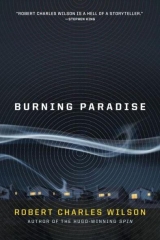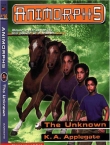
Текст книги "Burning Paradise"
Автор книги: Robert Charles Wilson
сообщить о нарушении
Текущая страница: 3 (всего у книги 20 страниц)
The Society kids in Cassie’s circle had given each other nicknames. Cassie was “Raccoon,” probably for the way her eyes looked after a typical sleepless night. Beth when she was younger had been “Angel,” but lately she had been called meaner and more explicit names. She had gone out with a lot of guys in school, mostly of the leather-jacket-and-flick-knife persuasion. Leo himself had credentials with that crowd… though, by Beth’s standards, Leo constituted a step toward respectability. Cassie had tried to ignore all that talk.
No angel could have looked as terrified as Beth did now. At the first sight of flashing red lights a few blocks away she went rigid.
And so did Cassie. Cassie had been harboring an unexpressed hope that they would find Beth’s father safe at home, that the death of the sim on Liberty Street had been a weird anomaly, that Aunt Ris was therefore also safe, that a semblance of sanity or at least continuity would be restored to her life….
But the ambulance in front of Beth’s building was flanked by police cars, and as Leo drove past she saw two paramedics came through the lobby door with a blanket-covered body on a wheeled gurney.
“Stop,” Beth whispered.
“I can’t.”
“Leo, for fuck’s sake!”
“I can’t stop, Beth. We shouldn’t even be this close.”
“Jesus!”
He sped up, though he was careful not to attract the attention of the police. Beth pounded her fist on the dash and started to cry—choked sobs, not loud enough to wake Thomas. At the corner Leo turned left and headed back to the parkway.
After a fill-up at a National Oil station in Cheektowaga Leo merged onto the Interstate, following the long curve of Lake Erie toward Cleveland. Thomas dozed fitfully, his head on Cassie’s shoulder as she watched exit signs announce the names of pleasant-sounding small towns: Mount Vernon, Wanakah, Pinehurst. Bars of November sunlight angled across Cassie’s eyes. From time to time Leo cracked the driver’s-side window, admitting gusts of chilly air. The four-lane highway glinted with mica flecks and sun mirages.
Cassie respected Beth’s grief with her silence. Leo had already said everything that could be said, including that the body on the gurney cart might not have belonged to Beth’s father. Beth had retreated into a sullen, steely indifference. “I don’t want to talk about it.” So no one talked.
Once they crossed the state border Leo left the Interstate for secondary roads where, he said, they were less likely to be followed. Outside Medina, Ohio, he stopped at another gas station so they could top off the tank and use the toilets. Cassie and Beth took turns at the ladies’ room, wordlessly. Back at the car Thomas complained that he was hungry. Cassie went into the convenience store and bought him a chocolate bar (Hershey’s with almonds) plus one for herself and a bottle of orange juice to share, along with an activity book she imagined might keep him busy. Puzzles, mazes, connect-the-dots. He looked at it with disdain. “Are we going home now?”
“No. You know that.”
“So where do we sleep?”
“We’ll stop at a motel, I guess. Soon.”
As the sun drifted toward the horizon Leo switched on the vehicle’s anemic heater. Lodi, Mount Gilead, Cardington: All these little towns, Cassie thought. Here a main street, a hardware store, a Chinese restaurant announcing itself with a neon dragon. Here a neatly whitewashed church with a wooden steeple. Here the last of the season’s dry leaves, wind-delivered to curbs and windowsills.
Small houses leaked yellow light from curtained windows. These were the homes of people who had never seen past the skin of the world and never would. Once, Cassie thought, she had been one of them. This was the world from which she had been banished: warm as a winter blanket, seen and abandoned in the same moment. She loved it with an exile’s love. It ran past the car in fading colors. She was tempted to wave good-bye.
4
 RURAL VERMONT
RURAL VERMONT
ONCE THE SIM WAS INCAPACITATED—THE 300-KV shock pistol was spectacularly effective—Ethan dragged the creature down to the cellar of the farm house.
What ever he did here, he would have to do quickly. The sim had come unarmed and begging for a conversation, and it might be important to find out why. But he couldn’t waste time. Obviously, the hypercolony knew where to find him. Which meant his sabbatical at the farm house had come to an end, and every second he lingered here put him at risk.
In the meantime his cameras and trip wires and automatic alarms continued to survey the property for intruders. Ethan bound the unconscious simulacrum to a heavy chair with duct tape, then went upstairs to consider his options.
He retrieved the sim’s jacket and shirt from the front porch and examined them. Both items bore midprice store-brand labels and could have been purchased anywhere in the country. There was a wallet in the sim’s jacket pocket—that was unusual.
The assassins of 2007 hadn’t carried identification, which was part of the reason local and federal investigations had failed to learn anything useful about them. (The fact that the few sims who were killed in the attacks had left radically unconventional corpses might also have had something to do with it.) Ethan opened the wallet cautiously.
He pulled out a hundred and fifty dollars in tens and twenties and a raft of cards, including two major credit cards, a Social Security card and a driver’s license. The documents had all been issued in the name of Winston C. Bayliss. The address on the driver’s license was 22 Major Street, Montmorency, Pennsylvania, and the laminated photograph resembled the face on the thing in the cellar.
Interesting. The simulacra were in most ways a mystery. None of the surviving members of the Correspondence Society had been able to determine how they faked their human appearance or to what extent they had infiltrated conventional human society. So how did an artificially-created monstrosity come to possess a Social Security number? Had it stolen the identity of a real (presumably now deceased) Winston Bayliss? Or were the cards simply forgeries?
How was he supposed to picture this? An inhuman monster living a quiet life in a small Pennsylvania town, waiting for the right moment to strike? Or, even more absurdly, an inhuman monster churning out fake ID on a clandestine printing press? And why had Bayliss (call him that for now) carried these documents to the farmhouse, knowing they might fall into Ethan’s hands?
But those were only footnotes to the larger question: Why had Bayliss shown up, unarmed and apparently defenseless?
It’s chilly out here, the creature had said. May I come in and speak to you?
And it had said something else:
You know what I am.
“Yeah, I know what you are.” Living alone had given Ethan the habit of thinking out loud. His voice bounced between the walls of the farm house kitchen. “And I know it’s no use listening to you.”
No use at all, because—if Ethan’s research and the conjectures of the Correspondence Society were correct—it wouldn’t be “Winston Bayliss” who did the talking. It would be the hypercolony itself, using Winston as its puppet. And the hypercolony would lie. More precisely, it would say what ever advanced its interests. The distinction between truth and falsehood was irrelevant to the hypercolony, perhaps even imperceptible to it. It generated human language solely for the purpose of manipulating human behavior.
Would Ethan discover anything useful by listening to it talk?
He guessed there was only one way to find out.
“What are you doing with that pistol, Professor Iverson?” the simulacrum asked.
It was awake again. The creature was still securely bound to the chair, wearing nothing but its underwear and taut ribbons of duct tape. Its head was immobilized, but it managed to dart sidelong glances at Ethan and at the revolver Ethan wanted it to see. The creature looked convincingly like a frightened, slightly pudgy Caucasian man shivering in the cool air of the cellar.
Ethan didn’t answer its question. His first order of business was to make absolutely sure that what he had here was one of the green-on-the-inside men, not some misguided or demented human being. He aimed the pistol at a point between the knee and the ankle of the creature’s left leg.
“Wait,” Bayliss said. “You don’t need to do that.”
Ethan pulled the trigger. The detonation was painfully loud in the enclosed space of the cellar. The bullet passed through Bayliss’s leg and cratered into the floor beneath him. Ethan ignored the ringing in his ears and assessed the results. Bright red blood gushed from the wound, along with a slower pulse of green viscous material. A sliver of bone showed through the damaged tissue, pale and moist.
After the gunshot, Bayliss’s expression became impassive and thoughtful. Ethan knelt and wrapped the wound with more duct tape to staunch the bleeding, wrinkling his nose at the rotting-flower stink of the green matter.
“That wasn’t necessary,” Bayliss said.
On the contrary. Now Ethan knew for sure what he was dealing with. “You said you wanted to tell me something.”
The simulacrum hesitated as if considering its answer, but Ethan put that down as theater: these creatures lied with gestures as easily as with words. “We have a common interest, Professor Iverson. It’s complicated—”
Ethan put the barrel of the pistol to the creature’s head. “Just speak.”
“You know what I am. I’m the same sort of thing that killed so many of your colleagues seven years ago. But I represent a different interest.”
“That makes no sense.”
“Most of what the Correspondence Society conjectured is true. The radio-reflective layer around the Earth is an active, living entity—that was a clever deduction and a correct one. It constitutes the body of what you call the hypercolony. The hypercolony is a living thing, another correct conjecture. But like any living thing, the hypercolony is mortal. It’s also subject to infection and predation. I represent an autonomous parasitical network that has infected the hypercolony and is struggling to control it. My interests are inimical to the hypercolony’s interests. I believe you’re capable of understanding that. That’s why I came to you unarmed and alone.”
The sim had simply reiterated what the Society had already inferred, with the addition of that claim about a “parasitical network.” Ethan would consider the plausibility of it some other time. “What exactly do you want?”
“I want your help. I can explain, but I’ll need more time.”
“Why would I help you do anything?”
“It would prevent a humanitarian catastrophe. And it might save the life of your niece.”
Startled, Ethan tightened his finger on the trigger of the pistol.
“That wasn’t a threat,” Bayliss said.
“What do you know about my niece?”
“It’s not safe here. It’s not safe for either of us. Take me away, and I’ll explain.
Of the many humiliating aspects of Ethan’s life since the events of 2007, perhaps the most demeaning was the veneer of craziness he had been obliged to assume. He refused to own a telephone, a television or a radio; he lived inside a lunatic’s cordon of security devices; he maintained an arsenal of handguns and rifles in his attic; and now there was a captive in his cellar, bound with duct tape and shot through the leg. How would that look to an outsider? Nothing short of rabidly, dangerously, self-evidently psychopathic.
It had been years since he had socialized with anyone who shared his ideas. Most of his old friends and colleagues were dead or isolated. Should he need to defend his sanity, he could call no living witnesses. He still had his letters, his Society papers, his unpublished research. But those would have looked as about as crazy as he appeared to be.
His ex-wife Nerissa would have understood all this, as would any of the surviving families of Correspondence Society insiders, and in his loneliness he had been sorely tempted to talk to her—but there was no way Ethan could get in touch without putting her at risk. He had remained in contact with the Society’s financial and intellectual leader, Werner Beck, but only by mail… and Beck was, if anything, more complexly paranoid than Ethan himself.
The sim calling itself Winston Bayliss had implied that the life of Ethan’s niece, Cassie, was somehow at risk. Like everything else the creature said, that might be a lie. Sickeningly, however, it might equally well be true. Ethan hadn’t seen his sister-in-law’s daughter for seven years now. He remembered Cassie as a quiet child, moody but thoughtful and easy to like. She would have turned eigh teen this year.
What did the hypercolony want with Cassie Iverson?
The question was probably unanswerable, a distraction. Coming up from the cellar to the kitchen, he glanced at the clock. An hour had passed since the sim’s arrival. Too long. He pictured himself dousing the floor of the farm house with kerosene—he kept jerricans of it in the barn where his car was parked—and setting it on fire. Burn the farm house, burn the barn, burn Winston Bayliss. Get behind the wheel of his old Ford and drive away. The charred bones and skull in the cellar, if they were discovered, would raise questions, but by then Ethan would be long gone… and he doubted any merely human agency could track him down.
But if the best he could hope for was to live out the rest of his life in some new and even more hermetic state of solitude, he might as well burn himself along with the building.
I want your help, Winston Bayliss had said. It might save the life of your niece.
But the thing in the cellar couldn’t be trusted. That was the bottom line.
He cradled the pistol in his hand. Killing the sim might be a tactical error, but it was the closest thing to revenge he would ever be able to take.
He was headed for the cellar when the alarm sounded a second time.
5
 ON THE ROAD
ON THE ROAD
LEO, WHOSE FATHER MADE SURE HE received every year a generous selection of fake ID and matching credit cards, rented a room in a roadside motel. The motel—pine forest on three sides, an empty pool behind a chain-link fence—was shabby but quiet in the off-season. Leo and Beth had signed in as a couple, so Cassie had to hurry from the car to the room with Thomas on one hand and her suitcase in the other in order not to be seen from the lobby. Sunset was fading from a cloudless sky, and although Cassie took only a cursory interest in astronomy she guessed the bright star on the horizon was the planet Venus. She caught a glimpse of it as the door closed behind her. One clear, cold eye.
The air of the room carried an undernote of mildew and Lysol. There was a small TV on the pitted and ring-stained dresser, and Thomas gazed at it with undisguised longing. Aunt Ris had not owned a TV set, on principle. Cassie had occasionally attempted to raise counter-arguments—even if television broadcasts were subtly deceptive, you could watch them as long as you kept that in mind, couldn’t you?—but her aunt’s ban had been non-negotiable.
Cassie guessed she understood. All radio and television signals were bounced through the radiosphere. That had been true since the days of Marconi and Edison. She remembered a photograph from her high-school history text, of Marconi and a crew of assistants at an experimental antenna station in Newfoundland, demonstrating what they called “resonant contact” with a sister station in the French town of Saint-Malo. Marconi’s feeble signals had been amplified by the radiosphere and accurately recorded by his counterparts in France. Of course, no one in those days had called it the radiosphere. “Radiosphere” was a term devised in the 1920s: a high-altitude boundary layer that had the surprisingly useful effect of propagating radio signals around the circumference of the Earth, depending on signal strength and frequency. What this layer was made of and how it worked remained open theoretical questions (in fact research was subtly discouraged), but broadcast engineers had rushed to exploit it. Global radio broadcasts had begun after the Great War, in 1921. Primitive black-and-white television broadcasting followed in 1935. Cassie had seen one of those vintage receivers for sale in a dusty antique shop: a comically small glass screen in a comically large wooden case; the proprietor had claimed it still worked.
So all radio and television was modulated by the radiosphere, as everyone knew. What everyone didn’t know was that the radiosphere was the distributed body of a living entity, and that the signals passing through it didn’t necessarily pass unaltered.
Three years ago Cassie had discovered a box of Correspondence Society monographs buried in the hallway cupboard where Aunt Ris kept the things she couldn’t bear to throw away but never looked at. The papers had belonged to Cassie’s parents; perhaps they had come to Aunt Ris after the murders, as a macabre heirloom, much like Cassie herself. Therefore she had had no compunction about rooting through the box and reading anything that captured her attention.
Most of the monographs had been incomprehensible to her, with titles like “Intracellular Signaling in Isolated Etheric Cell Cultures,” and these she quickly set aside. But one of the papers concerned TV broadcasting, and she had understood almost every word of it. The author, a television engineer, had compared studio recordings of nightly news programs with his own recordings of the same programs as they appeared after they had been broadcast. (Cassie imagined him poring over the footage frame by frame, with the sort of fanatical attention Thomas brought to the puzzles in his puzzle books—find five differences between these pictures.) In each case, the changes he discovered were numerous but dauntingly subtle. The most blatant example was a glitch (a momentary blackout) that obscured the spoken word “hatred” in a report about ethnic tension in Uganda. The least obvious were countless small but measurable modifications of the image and voice of the news hosts and reporters. What these subtle alteration of expression and inflection were meant to achieve the author couldn’t say, though he noted “a general softening of emotional affect.” It was really just one more data point in what Cassie had come to think of as the mysteries of the hypercolony (which was what Society documents called the collection of tiny living cells that comprised the radiosphere), but it helped explain her aunt’s distrust of television and radio. What emerged from the speaker or appeared on the screen was tainted, poisonous, a subtle and insidious lie.
Cassie understood and agreed, but Aunt Ris’s absolutism had still annoyed her. TV couldn’t be trusted, but did that mean it shouldn’t be watched? The shows people talked about at school sounded interesting, and Cassie was treated as slightly dim for not having seen them. Thomas’s exposure to television had been the same: it was a rare treat, forbidden for reasons he didn’t entirely understand and often resented.
Thomas looked at the motel-room TV, then at Cassie. Cassie sighed. “Go ahead,” she said. “Turn it on.” (It wasn’t as if it watched you.) Moments later Thomas was sitting cross-legged on the bed, smiling at the dumb jokes on Piggy’s Island, a sitcom about a group of shipwrecked British schoolboys.
On the dresser next to the TV was a telephone, white plastic gone the color of old bone. It was another device less useful to Cassie than to ordinary people. An ordinary person could pick up the receiver and make a call without a second thought, not caring that all calls, even local ones, were routinely routed through the radiosphere. If she were an ordinary person Cassie could have tried to call Aunt Ris. But such a call would be insanely risky, endangering both parties. Better not to think about Aunt Ris at all, if she could help it.
Leo and Beth retreated to the back of the room, talking in tones too low for Cassie to hear. Beth shot periodic aggrieved glances at Cassie, while Leo spoke slowly and showed her the palms of his big hands. Cassie ignored them.
Eventually Leo grabbed his jacket. “Beth and I are going out to pick up some food. Anything you guys need while we’re out?”
Not really. Cassie’s emergency suitcase was well and wisely packed. “Let me chip in,” she said, going for her purse.
“To night’s on me. Save your money. We might need to pool our resources later.”
Moments later Cassie was alone with her little brother. She forced herself to pay attention to Piggy’s Island. The two protagonists, Piggy and Ralph, had discovered a parachutist stuck in a treetop. Their attempts to get him down somehow involved pelting him with coconuts. Thomas watched somberly and laughed only once, a sound Cassie found startling in the wintry silence.
After an hour of television Thomas started to look drowsy, but the sound of voices as Beth and Leo came in—not to mention the smell of the pizza—brought him back to ready alertness. He grabbed two slices from the box and settled back in front of the TV.
Beth ate a little, then announced she wanted a shower. As soon as she had locked herself into bathroom, Leo asked Cassie to step outside. Cassie was surprised and immediately apprehensive. Bad news, she suspected. Maybe Beth convinced Leo to dump her and Thomas at the nearest bus depot. And if so, she thought, so be it. She left Thomas to his pizza and joined Leo in the darkness just beyond the door, her woolen jacket draped over her shoulders. She waited stoically for the dismissal.
Leo took a cigarette from the pack in his pocket. He lit it, shook out the match, gazed at the pine tops silhouetted against a moon-blue sky. “Don’t mind Beth,” he said, breathing smoke into the November air. “She’s dealing with what happened to her father. What might have happened to him. No love lost there, but… you know.”
“I guess,” Cassie said.
For most of her adolescence Cassie had been aware of Leo and Beth. They had been part of the older contingent of Society offspring, not quite in her circle. The Society survivors who had come to Buffalo were like family: quarrelsome, not always close, bound by shared secrets. Leo usually ignored her at the periodic gatherings, but she had made a careful study of him.
His tobacco habit, for instance. He smoked, Cassie suspected, for the same reason he carried around paperback editions of bohemian novels, for the same reason he affected an interest in the music played in downtown clubs and coffee houses: it defined him as other in a way that required no explanation. It made his otherness seem like a choice.
But at least for to night he had dropped the act. He coughed and said, “It’s pretty obvious Beth isn’t happy about you and Thomas coming along for the ride.”
“Uh-huh.”
“I just wanted to say, you shouldn’t blame her. She can’t see past her own unhappiness. She’ll calm down sooner or later. So don’t take it personally.” He took more smoke into his lungs and let it seep from his nostrils. A truck rumbled past on the highway. “Do what you want, Cassie, but I think we ought to stick together at least until we get to Ohio.”
Which was slightly surprising. “Until we see your father, you mean.”
“Right. Because it’s different this time. If the sims are going after people like your aunt, they must be going after everybody who knows anything at all about the Society. You, me, Beth—even Thomas. Do you have a plan to deal with that?”
“I have two sets of ID and I’m of legal age. I have enough cash to get by for now. I can find work somewhere and just… blend in.”
“Blend in,” Leo repeated, with a smile Cassie found irksome. “Are you sure the ID hasn’t been compromised?”
She shrugged. “Can’t be sure of anything.”
“Which is why I think we’re better off watching each other’s back. At least until Ohio.”
“I guess. Okay, so what happens in Ohio? What do you expect to find when you knock on your father’s door?”
Leo dropped the cigarette and ground it under his heel, then parked his hands in his jacket pockets. “You know my father’s reputation.”
“Just that he has deep pockets. And some strong ideas.”
“Of all the people who lived through ’07, he was the only one who wanted to do something more than turn tail and hide. He told me once, the sims wouldn’t have come for us if they weren’t afraid of us. And if they’re afraid of us that means we must have the power to hurt them. Hurt it.” He turned his face to the sky. “That thing. Wouldn’t you like to hurt it, Cassie?”
“If I thought we could. Sure. But—”
“What?”
“Well, I have Thomas to look after. Also, no offence, but I’m not sure you know what you’re talking about.”
Leo’s sharp look morphed into a smile. “You’re right about your little brother. But stick with us, Cassie. I mean it. Stick with us at least until we’re sure we’re not being followed. Maybe until you get a chance to talk to my father, if…”
“If he’s alive.”
“If he’s alive. After that you can find yourself a job in one of these dumb little towns. If that’s really what you want.” He opened the door to the room and held it for Cassie as she stepped back inside.
They’re not dumb little towns, she thought. If saying so made Leo feel superior to the people who lived in them, so be it. But he was wrong. And at the root of the wrongness was envy.
All those little towns out there in the dark, she thought, and all those cities, too, all the people behind their yellow windows taking for granted the sanity and predictability of things in general. It would be easy and satisfying simply to hate them. But Cassie remembered too well the time when her own life had been like that, when she had been unambiguously proud to stand up on Armistice Day and salute the flags of the United States and the League of Nations and everything they seemed to represent: the century of peace, the inexorable advance of freedom and prosperity. Things she still wanted to believe in.
Thomas sat slumped on the bed, his eyes drifting closed though they were still fixed on the television screen. A news broadcast had come on, a woman in a neat blue suit talking about crop failures in Tanzania. Massive shipments from the International Grain Reserve had arrived at the port of Dar es Salaam. The newscaster’s expression conveyed her sympathy. But that could have been an adjustment performed by the hypercolony, a subtle enhancement, what movie people called a special effect.
Beth came out of the bathroom wrapped in a towel, water dripping from her hair to her shoulders. “Turn that shit off,” she told Cassie. “And get your brother off the fucking bed. I need some sleep.”








